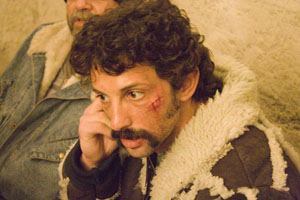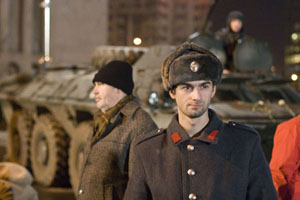Stills


Feature film / Romania / 2006 / 95 min / colour / English subtitles
Director: Radu Muntean
Paul Ipate, Adi Carauleanu, Dragos Bucur, Tudor Aron Istodor, Alexandru Potocean, Andi Vasluianu
The Romanian revolution of 1989 finds Costi Andronescu three months away from his release from the army. The armoured vehicle unit he is part of is ordered to patrol Bucharest’s neighbourhoods. Their radio barely works and all they can tell from it is that it seems the national TV station is under attack. Costi considers it is his duty to fight against the dictatorship, and he runs to fight the ‘terrorists’ at the TV headquarters. But before getting there, he is arrested as a terrorist himself...
It’s a night of madness – soldiers receive orders via television from poets and actors, radios transmit garbled signals, arms are distributed to civilians and gypsies are arrested as Arab terrorists.
“The Paper will be Blue doesn’t offer a History Channel type of perspective, but wants to reconstitute the feel of those days from the point of view of the small actors of the events. It is the story of a generation losing its innocence, and of a popular revolt that revealed our best and our worst in an equal measure.”
Best Film at International Eurasia Film Festival, Turkey 2006
Born in 1971, Radu Muntean graduated in 1994 from The National University of Drama and Cinematography, Bucharest. Continued with a successful career in advertising and returned to cinema in 2002 with his debut feature film The Rage (Furia).
2006: The Paper Will be Blue; feature film, 95 min, colour – director, co-screenwriter
2002: The Rage; feature film, 90 min, colour – director, screenwriter
1996: Life Is Elsewhere; documentary, colour – director
1996: The Tragic Love Story of the Two; short film, colour – director
1994: She; short film, colour – director
1994: Lindenfeld 1994; documentary, colour – director
1992: They Are Also of Our Kin; documentary – director
“Revolutions resting on mass mobilization and state breakdown tend to encompass both the swirl of the battle and the chaos of defeat”, reads a recent book on December 1989. The violent transfer of power that took place in Romania at that time was called a ‘revolution’ and a ‘popular uprising’, but also a coup d’etat, a ‘revolution in quotation marks’, a ‘fake’ or ‘stolen’ revolution - the idea being that the genuine mobilisation of the population was allegedly ‘hijacked’ by former apparatchiks with own agendas.
December 1989 was mythologized while still in the making: First, there was the myth of the omnipresent and omnipotent Political Police (Securitate), ready to intervene and re-install mass obedience. Then the myth of the ‘terrorists’ took shape, as an embodiment of the malign Ceausescu regime. Everything seemed credible in the state of excess and anticipation of the time, and the inflated casualty figures circulated in the media just added to the confusion.
Muntean’s film captures in docudrama style the minimalist story of a group of youth folk caught in the midst of the events. The Paper Will Be Blue is a glimpse at the everyday life of a revolutionary moment. The film revisits some of the most significant ‘sites of memory’ attached by Romanians to the events in December 1989: from ‘Television’, to ‘terrorists’, to ‘poisoned water’. It conveys the sense of a time of deep crisis, but also a sense of community and shared goals which is now lost.
Muntean was a soldier in December 1989, so there is a certain biographical seed at the heart of his film. His younger actors were children or teenagers at the time, so they had to learn from documents about the thrill and urgency of those days. A special mention for the film’s dialogues, where one can sense the touch of screenwriter Razvan Radulescu (co-writer to Cristi Puiu’s Death of Mister Lazarescu), alongside Radu Muntean and Alexandru Baciu. (A.B.)

